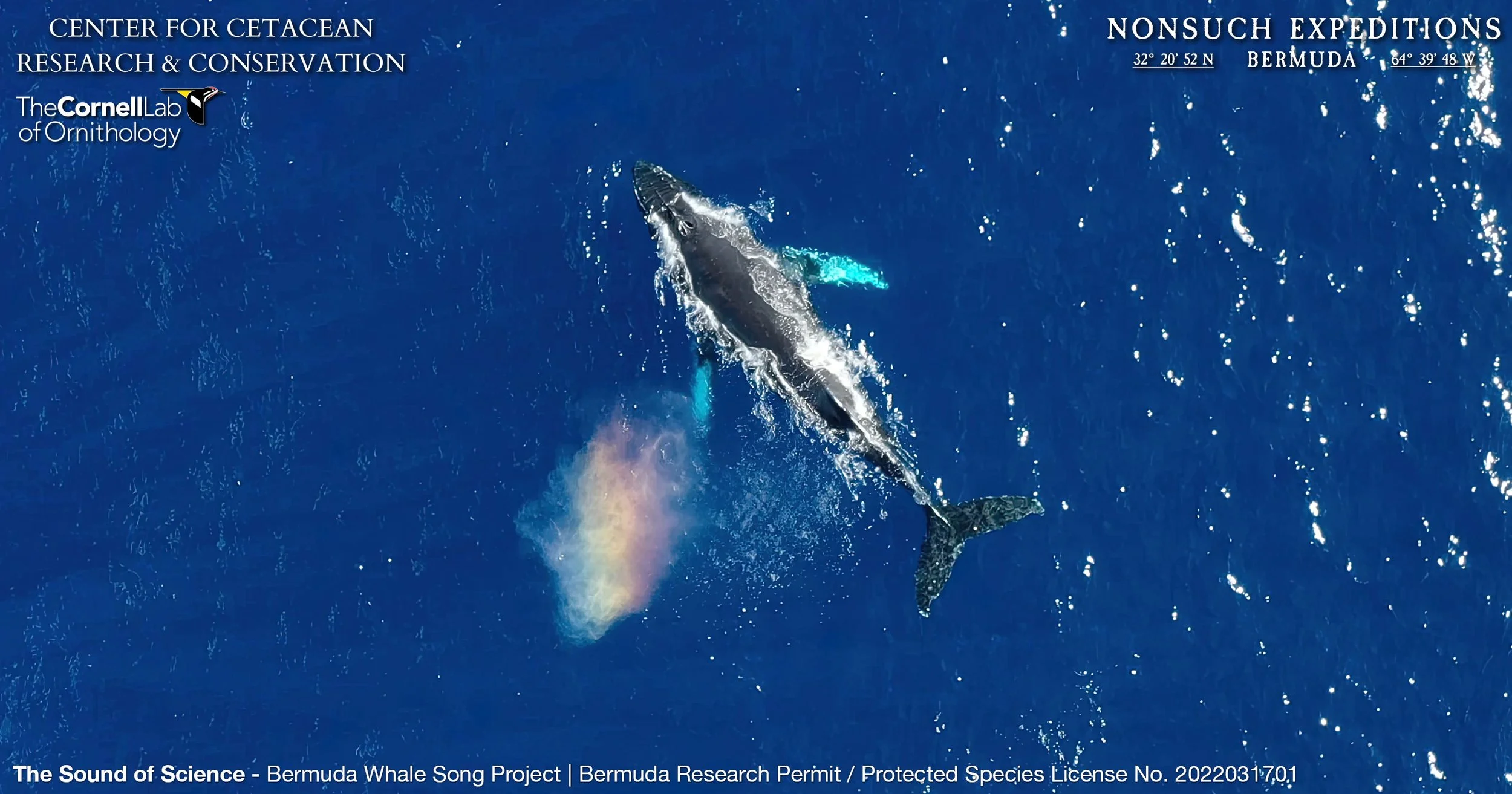“The Sound of Science”
The Bermuda WHAle SONG Project
The EVOLUTION OF WHALE SONG IN BERMUDA
Research Permit / Protected Species License No. 2022031701
Press Release March 27th 2022
As part of the Nonsuch Expeditions, Jean Pierre Rouja has partnered with Cornell University and the University of California, San Diego in a project to record and analyse the acoustic soundscape of Bermuda’s reefs and surrounding seas. Under a research permit issued by the Department of the Environment and Natural Resources, they aim to develop ways that the results will be used for conservation purposes.
After detecting whale song throughout the recordings, J-P. set out to determine how this might be used in their conservation. He reached out to Nan Hauser, President & Director of the Center for Cetacean Research and Conservation, who not only has over 30 years of experience in the field of whale research, but also spent much of her formative years with her family in Bermuda, where she fell in love with whales. You might be one of the over 600 million people around the world that saw Nan in the field being protected by a humpback whale from an approaching tiger shark. The humpback pushed her on his head and pectoral fin for over ten minutes to get her back to the boat to safety. See: www.whaleresearch.org or video: www.youtube.com/watch?v=0NtBqnKg1Ms
The Sounds of Science project is an extension of the acoustic study and will involve ongoing analyses of humpback song and behaviour from different parts of the world.
Along with founding partners the Nonsuch Expeditions, The Center for Cetacean Research & Conservation and Cornell University Bioacoustics Lab, the Bermuda Whale Song Project: “Sounds of Science” is a collaboration that includes other world-renowned researchers. For the next few years (and ideally as part of an ongoing time series), acoustic recorders will be deployed to record and archive humpback whales that pass through Bermuda’s waters. Bermuda will serve as a field station and testing platform for enhancing, developing and upgrading bioacoustic recording technology. A broad spectrum of data will be collected on whales and ocean life relating particularly to behaviour, acoustics and song structure helping researchers address the growing issues of climate change and bio-masking. Data compiled from this long-term project will assist in the protection of ocean life and whales in Bermuda’s waters and extending out into the Sargasso Sea.
This timely project takes us back to the place where humpback whale song was first recorded.
Bermuda has a long history of scientific studies of whales, including their songs. Frank Watlington, a Bermudian, recorded humpback whale songs in the 1950s working with the US Navy. The Bermuda song recording “Solo Whale” was an insert in National Geographic Magazine in 1979. These efforts were instrumental in the “Save the Whales” movement back then.
Song is a universal way to communicate. The songs of whales are considered to be more effective than human language, however, the complexity of their communication system is still not understood.
With the rapid progression of changes in our climate and the negative effects it is having on the environment, this consortium of scientists has serious concerns about the overall status of marine mammals, primarily humpback whales that rely on Bermudian waters to mate, give birth, and pass-through this migratory corridor on their migration.
Little is known about the effects of anthropogenic noise, humpback whale song interchange, & marine life adaptation in Bermuda. This study will help to develop solutions to these threats while contributing to long-term conservation measures.
Recording humpback songs is not as simple as it sounds. The science includes locating singing whales that spend 99% of their time underwater, securing photo ID shots, collecting sloughed skin for genetics, noting the latitude and longitude, calculating population abundance of the area, identifying competitive singers in the area, and recording the depth of the whale. We observe if singers are using the reef as an amphitheatre by collecting bathymetric information, proximity to seamounts, the presence of reverberation in the song, etc.
If you would like to arrange a talk or presentation to learn more about the project and Nan’s three decades of wild whale experiences around the world, please contact: jp@nonsuchexpeditions.com or nan@whaleresearch.org or call phone # 333-5555
Visit: http://www.nonsuchisland.com/whales
Video embed: https://youtu.be/RhqTumWigNY
Update March 24th, 2022: We conducted our first pilot expedition off of Challenger Bank in Bermuda! We collected whale photo ID's, sloughed skin samples for DNA, drone footage displaying behavior of a competitive group of 5 humpbacks and a perfect 2022 humpback song from beginning to end.

